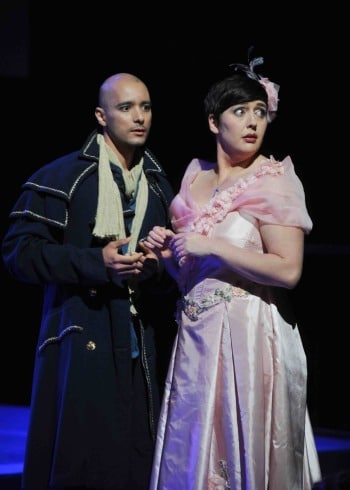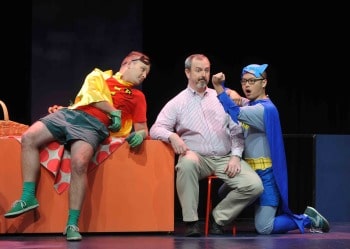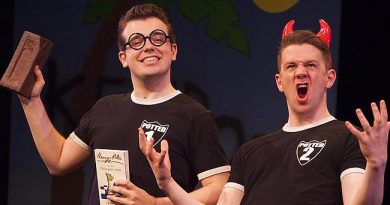Melbourne Lyric Opera: Werther
I’m comparing Lyric Opera of Melbourne’s new production of Werther as a little tugboat compares to a cruise ship. That’s because the last time I saw Werther was earlier this year at New York’s gigantic Metropolitan Opera starring Jonas Kaufmann and Sophie Koch. Before that, in Paris, the same pairing beguiled in an Opéra National de Paris production in 2010. But tugboats power beyond their deceiving looks and that’s exactly how this mighty little Lyric Opera of Melbourne’s production feels.

Loosely based on Goethe’s The Sorrows of Young Werther, Jules Massenet’s opera premiered in 1892. It tells the story of the young poet Werther, who falls for and obsesses over the already-engaged Charlotte. From early joy, the tone of the lengthy four-act opera falls decidedly grim by the end of the first act, so the biggest challenge for director Suzanne Chaundy and conductor Pat Miller is keeping the momentum and intensity of the drama alive.
Chaundy shapes her cast well and catapults the story into a contemporary setting of laptops, mobile phones and, early in the first act, masquerading super-heroes. Although moments of muddiness creep in, everyone sings English with a clarity and engagement that doesn’t require supertitles, so their presence isn’t missed.
Chaundy’s interpretation is materialised with abstract, oblique lines and understated, casual costumes by designer Christina Logan-Bell. The angularity of the raised set integrates artistically with the pit and the action occasionally spills into the darkened, dead side spaces for total spatial drama. The crisp, hard lines add drama to the arabesque modulations of the music but the seasonal shifts don’t seem reflected in some mismatched costumes. Lucy Birkenshaw’s evocative lighting design and Zoe Scoglio’s unfussy screened video projections help to compensate.
Jules Massenet’s music mostly sits unobtrusively yet descriptively under the vocal line to create a synergy with the drama and then opens out with beautiful bursts of melodious perfection.
Conductor Miller’s energetic style and evident connection with his cast and the 16 musicians of the orchestra, delivers Werther’s tragedy with generous and pleasing results. The strings’ warm woven threads, together with fluid woodwind playing, ably support Massenet’s soundscape. Occasional patchy moments trickle into the evening but everything to warrant the beauty of the music peaks throughout Act 3’s poignancy.
In fact, everything seems to come together in Act 3 from the moment Charlotte reads Werther’s letters (emails) from a laptop and Werther arrives to realise Charlotte returns his love, then soon after turns him away. Great sensitivity in the music, the dramatic character portrayal and the visual mood produce a proud and powerful kind of opera.
Up there with one of the most brave performances I’ve witnessed, Shanul Sharma presents Werther with a playful and impetuous urgency and a soulful robust masculinity in his attempts to win for Charlotte’s love. With just a smattering of opera credits since finding his way into opera from heavy metal less than two years ago, Sharma exhibits unselfconscious confidence, plentiful vocal steam and a powerful high range. He sings with an untiring built-in natural vibrato, attractive though heavily protracted, strangling the opportunity for vocal shading. But there are great signs to suggest this voice can flourish and I’m keen to hear it. And consider that the score was only handed to him little more than a month ago.

As Charlotte, Margaret Plummer is many things. While tenderly mature as a sister to Sophie and another six young girls, fiancé and then wife to Albert, she is also stricken by her troubled thoughts and feelings for Werther. Plummer glistens with nurturing pride in the role. Relaxed in voice and exhibiting purity, breadth and expression, she steals the night with her enigmatic stage presence.
Pivotal to the opera’s impact is the pairing of Charlotte and Werther. For Plummer and Sharma, it took until Act 3 to feel a combined chemistry but from here and into Act 4, even as Werther’s drawn-out death can be testing, their grip on each other felt convincing despite their initial attraction not feeling right. Werther’s suicidal death is one of the slowest in opera, so I did wonder why the heck Charlotte couldn’t get onto her mobile phone to call 000!
Poles apart from Werther in persona and style is Bruce Raggat’s daggy, fuddy-duddy and jealous Albert. Solid, forthright and burnished-voiced, Raggat impresses as he tries to foil Werther’s interest in Charlotte.
In other roles, Daniela Leska is full of vitality and bright voiced as Sophie, and James Payne as the widowed bailiff and father to eight girls demonstrates an unassuming and vocally rich character. And of his other six young daughters? Dressed in a little girls general preference for pink (or an adult’s signature for sexual identity), this chorus of both angelic and cheeky faces added gorgeously fine-voiced zing to festivities. The entertaining shenanigans of Bernard Leon and Daniel Sinfield as Schmidt (Batman) and Johann (Robin) complete the cast of varied personalities.
Up close in the gabled embrace of Chapel off Chapel, this Werther is worthy of a visit to see how opera powers along with artistry, enthusiasm and bravery outside the perceived glamour of the larger houses. There is something to look forward to in Lyric Opera of Melbourne’s year ahead.



